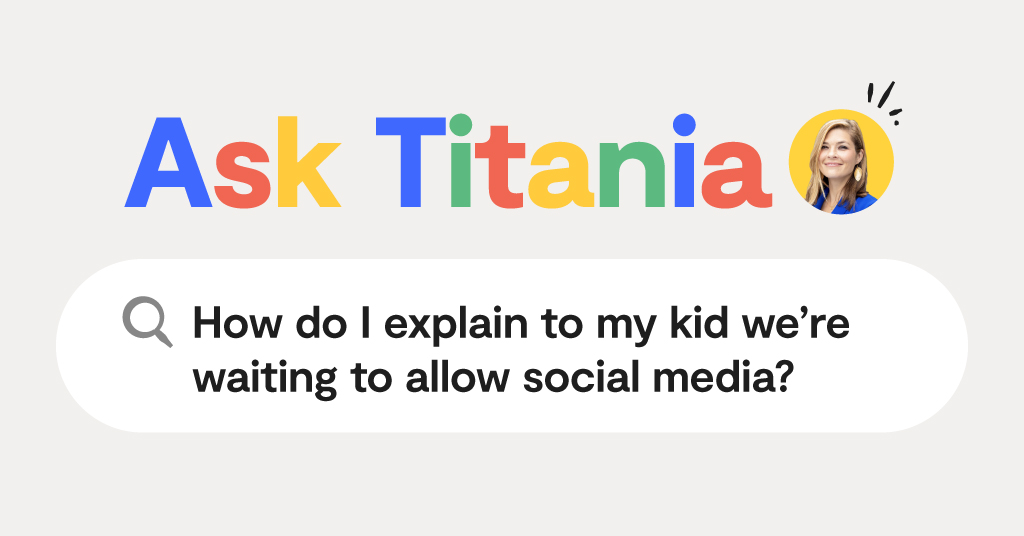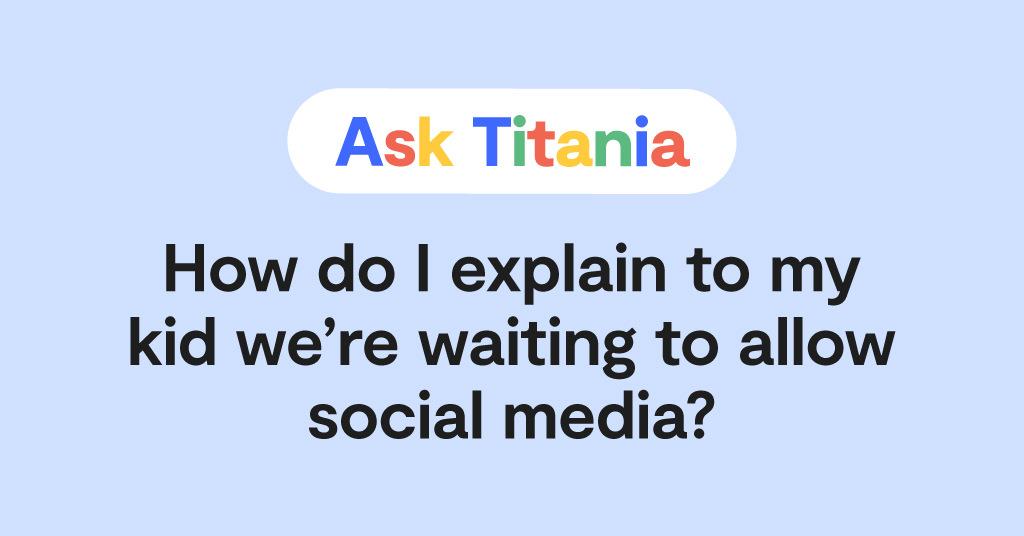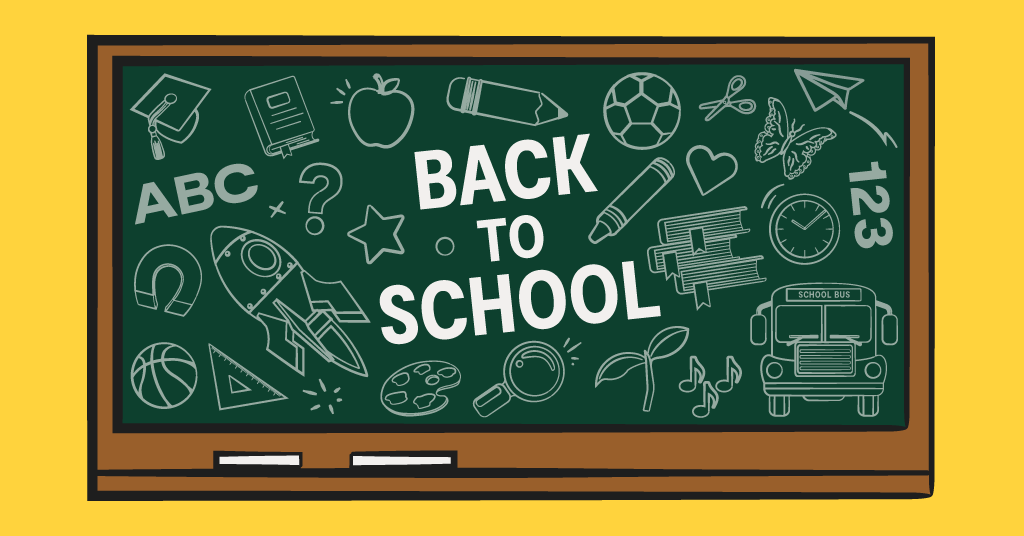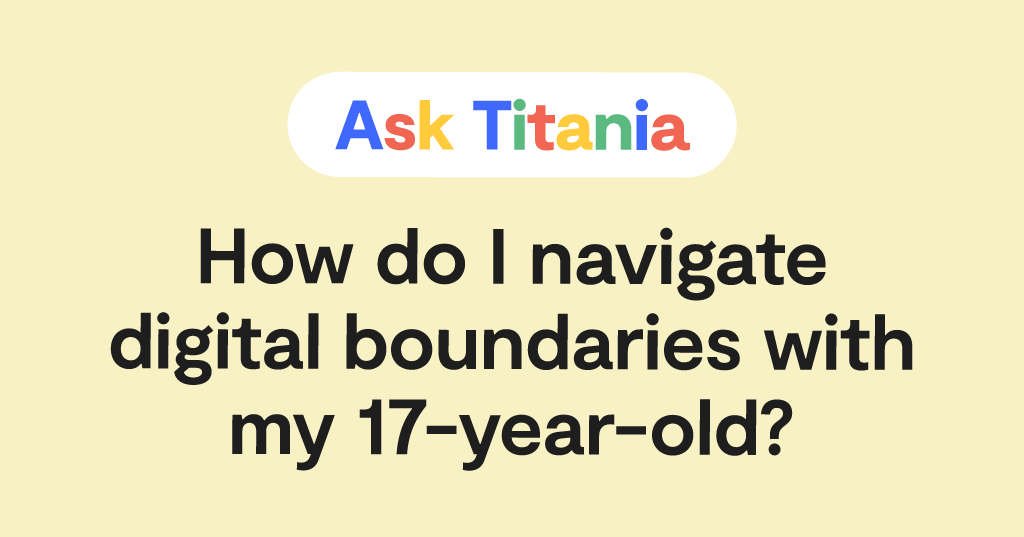
Dear Titania,
My son just turned 13 and is begging for social media like Instagram or Snapchat. Most of his friends have had these apps for a while, but I still don’t think it’s a great idea – even if 13 is the “official” age that many platforms say is okay for kids. How can I help him to see this isn’t just because I’m a stick in the mud, that I’m actually looking out for his best interest? I want to have more reasons than just “I said so” so he knows what I’m thinking.
Signed,
Would Love Help Explaining Why We’re Waiting
Dear Would Love Help Explaining Why We’re Waiting
Oh boy, this is hands-down the hardest question I get when talking to parents. Unlike almost every other rite of passage — riding a bike, learning to drive — when to give your kid social media is hotly contested. And there’s a number of equally valid reasons because every single family (and kid) is different.
The outcomes can be wildly different, too. Some kids will get Snapchat and just send silly selfies with dog ears to their limited circle of close friends. Others will use it to send risky messages and photos that definitely shouldn’t be sent to people they may not know in real life. It can be quite a surprise figuring out which camp your kid may fall into!
As we begin, know that this is such a hard thing to decide and talk about with your kid. I appreciate you wanting to give reasons and talk about it openly and honestly. Many parents rely on the “because I said so” approach and while they’re not wrong (they’re the parents!), it’s not always the most effective way to get your kid to understand.
And taking the time to have a dialogue with your child can go a very long way in strengthening your relationship, especially as you approach the teen years, where you’ll probably butt heads in countless different ways.
Start with the Objectively Good Reasons
Let’s kick this thing off with something a little eye-opening. Of all the thousands of parents I’ve talked to over the years, no one has ever expressed regret over waiting longer to give their kids social media.
And the exact opposite is true for those that caved and allowed it earlier. Social media exposure is one of things that’s hard to roll back — you can't put that toothpaste back in the tube.
Social media is also still relatively new in the grand scheme of human existence, and we’re not sure of its long-term effects on children’s mental health. In addition to external dangers like predators and bullying, these platforms also may contribute to disordered eating, anxiety and depression, and suicidal ideation. This is all scary stuff!
If your child is mature enough to handle some serious topics, I highly recommend sitting them down and watching the free documentary Childhood 2.0.
This film dives deep into the issues facing their generation and talks to actual teens as well as experts. Feedback from kids is generally positive, especially because they will relate to the other young people in the documentary. Plus, Childhood 2.0 is a good way to kickstart your own conversations with your child about your concerns. A TL;DR of the things discussed include:
- Screen addiction
- Porn
- Social media and the comparison trap
- Online predators and grooming
- Suicidal ideation
Acknowledge That You Know This Will Be Hard
Picture this scenario: You’ve laid down the law and said no to any and all social media, no matter the platform. But —your child’s travel baseball team has decided to start a group Snapchat for team updates and messaging.
What do you do?
This is where it’s going to get hard. Like really hard. You can try to talk to your child’s coach and see if there’s another platform like GroupMe they can use instead, and they may (or may not) listen. There’s a chance you may be the only holdout, and so the idea may not fly.
This is just one example of the many ways principles can clash with the daily reality of social media, and the little nuggets of frustration they’ll produce.
Another way is that your child will also probably start asking because our social lives do tend to revolve around social media. Kids are no different. You probably keep up with your own friends on Facebook and Instagram.
Granted, kids aren’t adults, and this isn’t a good reason to cave, necessarily. But as we grow more and more entwined with our smart devices, it’s going to start affecting people at younger and younger ages.
But sticking to your guns is a perfectly valid way to approach social media, and is definitely the safest way to allow your child to grow up. But it will eventually cause some pretty heated arguments, especially as kids inch towards adulthood.
Conversation Starters
Talking about social media and your rules can automatically put your child on the defensive before you even start. Trust me, I know very well what these discussions look like. Here are a few way to start a conversation that is productive and helpful:
- Ask, “What do you think are the most dangerous parts of social media?” This question will help you see where your child’s head is when it comes to the big picture. They may groan and say “I’d never talk to strangers” but the truth is, kids don’t always know who their online friends are.
- Ask, “What will this specific social media platform allow you to do that you can’t do now?” Listening is a key aspect of building your relationship and opens the door to conversations that might not otherwise take place.
- Ask, “What would you do if someone started making you feel weird online?” No matter how they answer this one, it’s crucial that your child knows they can always, always come to you if something scary is happening online. Kids are going to make mistakes, but it’s critical that they trust you to help them and not just get angry or punish them.
- Ask, “What are some things you’ve heard about people getting into trouble with social media at school?” This will help you understand some of the rumors and stories about things that get out of hand.
- Ask, “Do you really want social media or are you feeling pressured because everyone else has it?” This is less common but I’ve spoken to some parents who have kids that are actually secretly relieved they’re not allowed to have social media. That way, instead of trying to keep up, they just say “My mom won’t let me!” and then have an out.
- Ask, “If you could have just one social media account, what would it be and why?” If it’s a social media platform you already have access to, talk to them about the good and bad that has come with you spending time on it. Set a date and time to reevaluate that request, perhaps in 3-6 months or whenever you notice increased maturity in your child and readiness to handle what comes with that kind of access. If you do not already have that app, go ahead and download it, create an account, and explore it on your own, first.
If It Gets Too Hard, Consider These Compromises
In Parenting in a Tech World, our Facebook group of more than 350,000 parents, we get so many conversations about this very question you asked. In between the two poles of no social media and no rules at all, many families fall somewhere in the middle. Here are just a few of the ways parents like you have split the difference. Caveat: There are, of course, ways kids can get around even these safeguards. But some parents have found greater luck than others. You know your kid best!
Allowing certain apps only a short amount of time a day
A lot of the bad stuff that happens on social media apps occurs late at night or with friends away from home. One way to get around this is to use Bark and set up a screen time schedule where your child can only use an app at a certain time of day.
For example, you could block Instagram for nearly the entire day, but allow it between 5 and 6 p.m. The urge to send sketchy selfies is definitely lessened when you’re sitting with your dad in the living room before dinner.
This way, you can control when they can even open the app. To make it even safer, you could make a rule where you get to sit with them and watch what they do or spot check the account.
Sharing login info
Some parents have found success with allowing their child to have say, Snapchat, but requiring the parent to be logged in at all times. This way, the parent gets notifications to their phone, but doesn’t open the images. You get to see what’s going on in the app, and have a general idea of who your child is talking to.
App downloads only with monitoring
Other parents allow their kids to have some social media but require Bark so it can monitor activities for danger. Unfortunately, Apple makes it really hard for Bark and other third-parties to monitor popular apps Instagram, TikTok, and Snapchat. But the good news is that Bark works great on Androids, and the Bark Phone even comes with our software built in for the best experience.
How Bark Can Help
Whether or not you choose to allow social media, Bark can help. After all, there’s more to giving your kid a phone than just apps. Bark gives your child a digital safety net with you at the center, managing the things that matter most to your family. You can block websites and apps, create screen time schedules, and track their location when they’re out and about.
But it’s Bark’s content monitoring that can be an absolute game-changer when it comes to online safety. If you go the route of eventually allowing social media, I can’t imagine doing it without using Bark.
Bark scans your kid’s social media accounts (and other apps!) for potential issues. If something concerning is found — like sexting, online predators, bullying, and depression — you’ll get an alert so you can check in and make sure everything’s okay. This is way easier than grabbing their phone scrolling back hundreds — or let’s be honest, thousands! — of messages. Bark alerts also prompt some pretty important and hard discussions that I wouldn’t have had otherwise.
Good luck! This is one of the hardest things parents face today. By even worrying about this issue, you’re showing the care and commitment you have to raising a healthy teen.
Read more
Bark helps families manage and protect their children’s digital lives.






